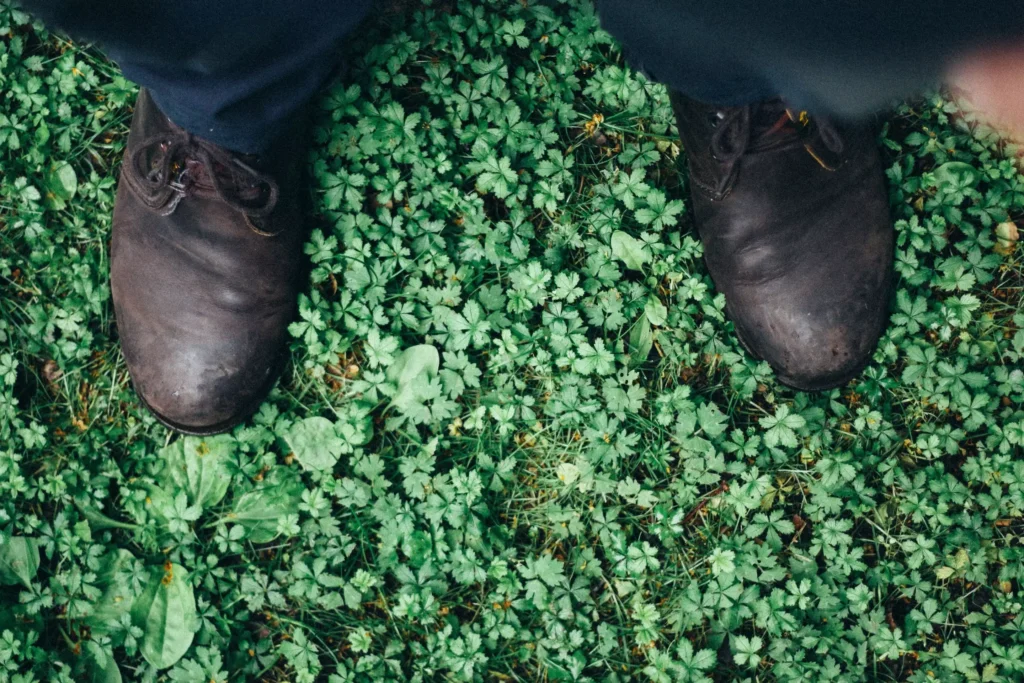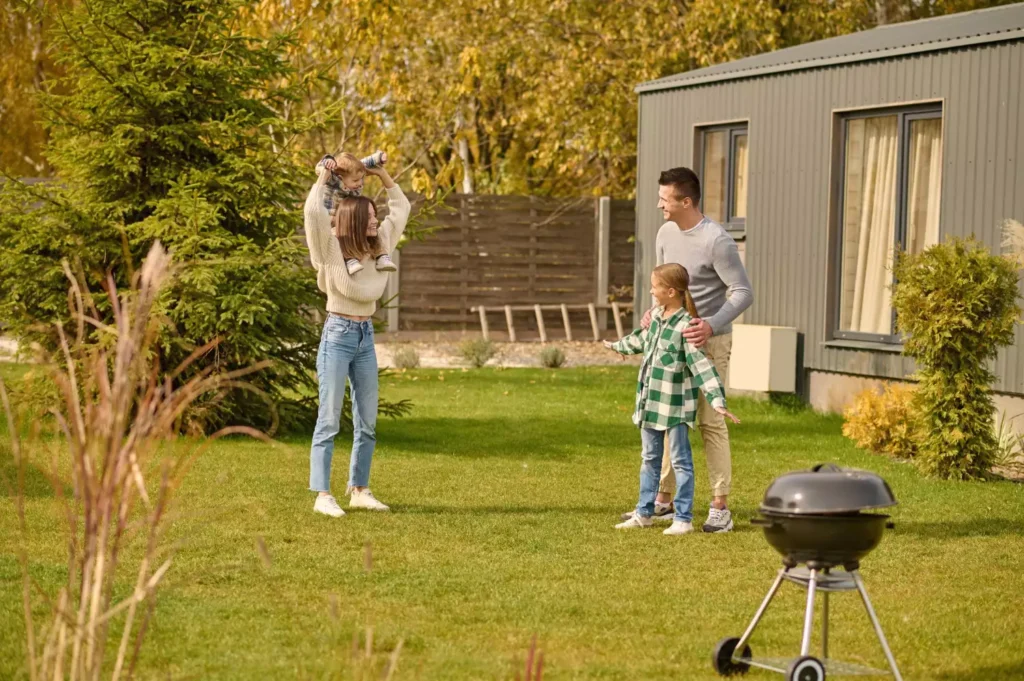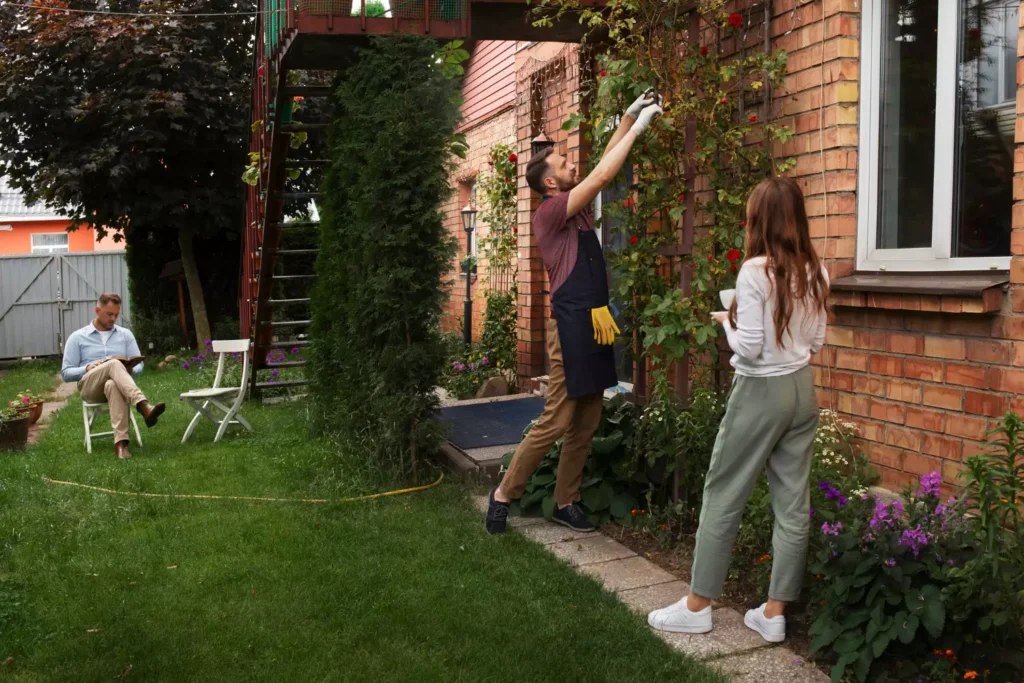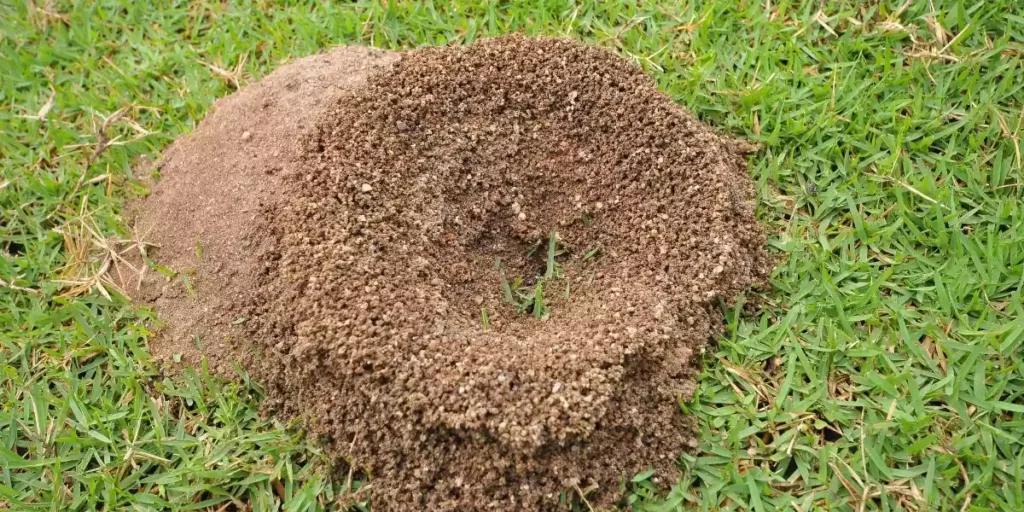Ants are omnipresent. All of us have had to deal with them, whether near our apartment or in our own garden. They perform a number of functions, however, there are times when they can cause us some problems….
Are Ants Beneficial?
Ants act a natural pest control
Ants, just as ladybugs and other beneficial insects, contribute to pest control by eating their eggs and their young, or by disturbing them while they are foraging. Of course, this doesn’t always work one way, as ants like to support some pests (such as aphids).
Some gardeners are deliberately introducing ants as part of an integrated pest management strategy. Interestingly, there are references to farmers using ants for pest control that go back as far as 300 AD!
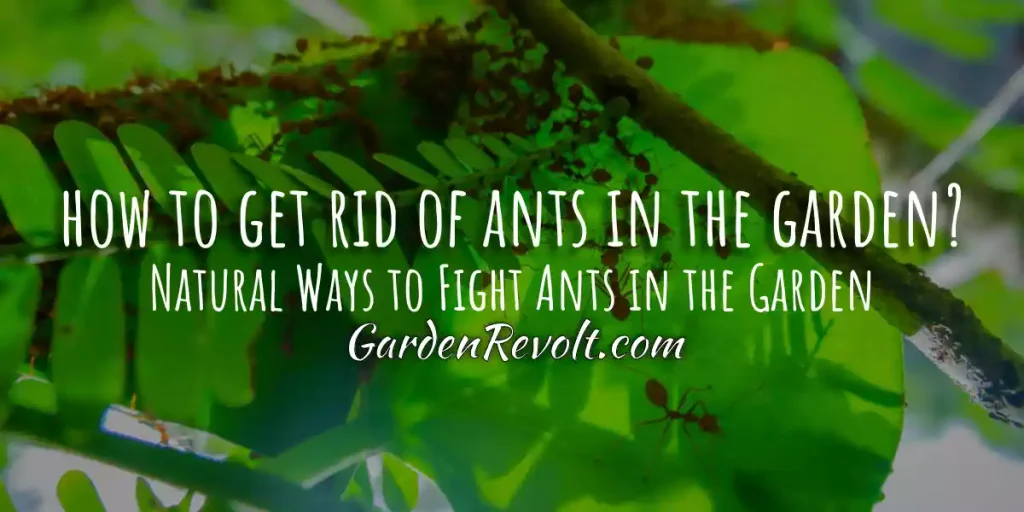
According to the article, titled “Ants as Biological Control Agents in Agricultural Cropping Systems” ants have a beneficial effect on agricultural crops because they quickly eat large numbers of pest insects, interfere with pests as they forage and lay eggs, and improve soil quality by increasing nutrients.
Ants increase pollination rates
Ants love the nectar of flowers. It is not uncommon for ants, marching from flower to flower in search of nectar, to often act as accidental pollinators. In addition, ants also take part in seed dispersal.
So do bees, hummingbirds and butterflies. Penstemon and peonies are among the favorite flowers which attract ants. If you have peonies in your garden, you’ve probably seen ants on them more than once. However, they are most often attracted to low-growing plants with small flowers, such as holly.
Ants are essential for a balanced ecosystem
Garden ants benefit the soil and help make it more fertile. They dig tunnels in the soil in search of food. In doing so, the ants break up the soil and allow oxygen, nutrients and moisture to reach the roots of plants and vegetables.
According to a study posted in the British Ecological Society, black garden ants (Lasius niger) and red common ants (Myrmica rubra) also play an important role in garden ecosystems. Scientists have called these animals “ecosystem engineers and predators.” What’s more, ants are a food source for larger animals, further increasing biodiversity.
Ants aerate the soil in the garden
Ants have a positive effect on soil health because they help aerate the soil. Healthy soil needs oxygen, nutrients and moisture for plants and vegetables to grow. Ants are among these beneficial insects that improve soil health.
Researchers at Harvard Forest have found that ants play an important role in the environment. For example, ants tunnel down organic matter, which decomposes and acts like fertilizer for plants. This behavior increases nutrient content, causes organic matter to decompose faster and improves pH levels.
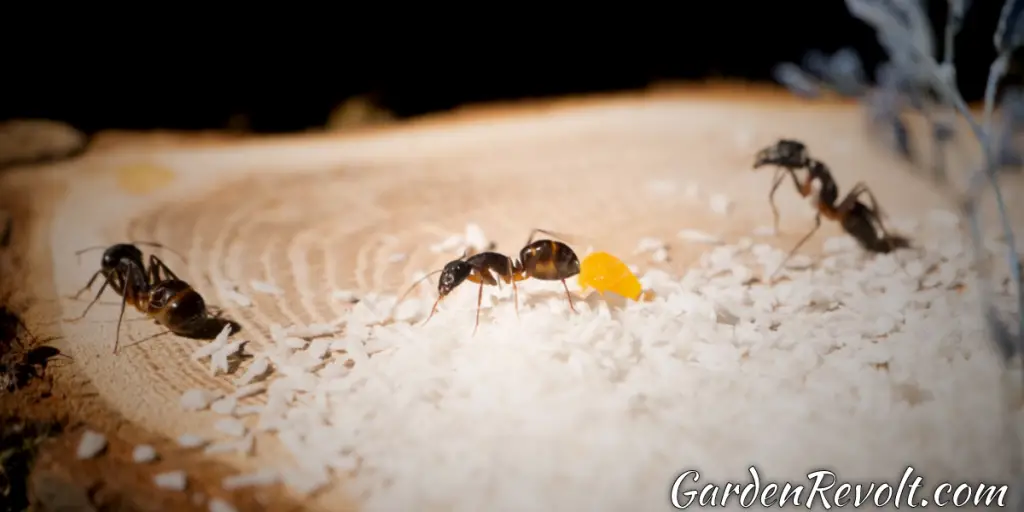
Are Ants Harmful to Plants in the Garden?
There are times when ants can do some damage in the garden. This, of course, depends on the type of ants. Of these unwanted things, ants can contribute to increasing the aphid population, destroying vegetable seedlings or causing other property damage.
Ants can increase pest populations
Ants are able to bring in pests and increase their population in the garden. The attraction for ants is the sticky, sweet substances that aphids produce in the form of honeydew. It is often the case that ants bring aphids into the garden, increasing their presence and damage.
Ants can cause property damage
Some species of ants, such as carpenter ants, can cause damage to wooden structures around the garden. They build their nests in the wood. And the worst part is that they are not particularly picky about the type of wood. Capable of endangering the structure of your home or the structures around your garden.
Are Ants Harmful to Vegetables?
Ant numbers, under normal conditions, can do a lot of good for a vegetable garden. They contribute to soil fertilization. They dig tunnels, which are needed to circulate air, water and all the minerals the roots need.
They can help with additional pollination of plants. So, if for some reason pollinators don’t want to fly in too much, ants can be such unwitting pollinators.
In addition, ants have their own natural enemies, some of which are harmful to plants and vegetables. Ants control some unwanted pests and even eat their larvae and eggs, thus keeping their numbers under control.
However, when ant colonies grow to abnormal sizes, problems with aphids can begin. And, as you know, aphids like to suck the sap out of plants (they produce honeydew, which ants love to eat) and can carry diseases.
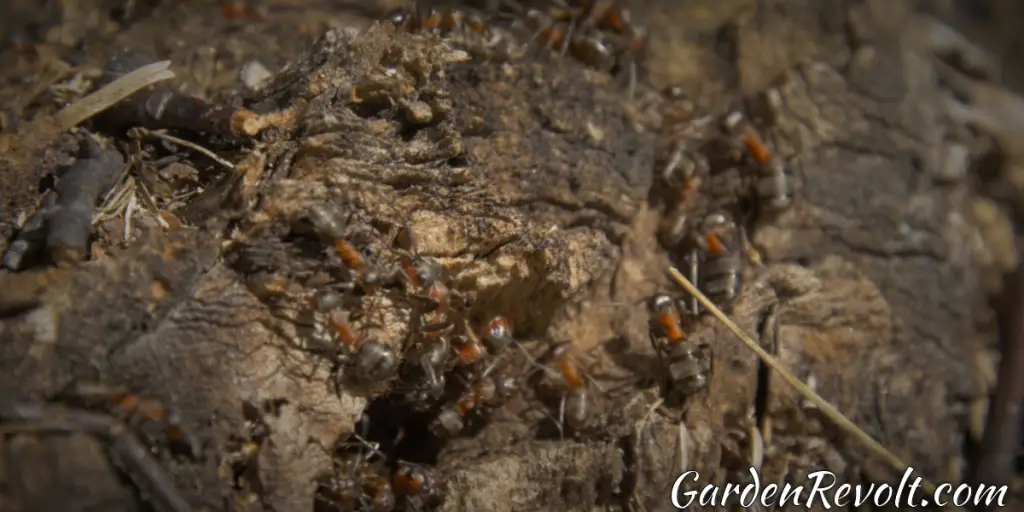
How to get rid of ants and anthills from your garden Naturally?
1. get rid of aphids
Ants can be attracted by the presence of aphids, and this can pose a serious problem for your vegetable garden. A key concern about the aphid problem is that they can eat the vegetation quickly and quite effectively, nullifying your hard work.
To detect aphids, you need to inspect the plants. Aphids are very small and are usually found under the leaves. Where the presence of ants – there may be aphids. I would start looking for them all around in places where ants are marching. Most aphids are green, although their color depends on the species. Once you start noticing damage to your plants, start acting quickly by first eradicating the aphids. The next step will be to take on the ants and their anthills.
Remove weeds that attract aphids, such as thistle and mustard, from the environment. Plant plants that attract beneficial aphid-eating insects – and these include Queen Anne’s lace (Daucus carota), parsley (Petroselinum crispum) and dill (Anethum graveolens).
2. Cayenne Pepper & Ground Cinnamon.
Sprinkle ground cinnamon or cayenne pepper around. The pungent aroma will repel ants without harming them. It may be that the ants will leave for a completely different place or create a path for themselves around the spilled cinnamon or cayenne.
3. Diatomaceous Earth
Spread diatomaceous earth near paths and nests. This fine powder, made from fossilized hard-shelled algae called diatoms, causes dehydration in ants (as well as snails and cockroaches). It is perfectly safe for humans and is even used as a supplement.
As for its effectiveness against ants, it may take a couple of weeks before it breaks up the entire colony. It is imperative that it stays dry, so use it only during sunny or rain-free days.
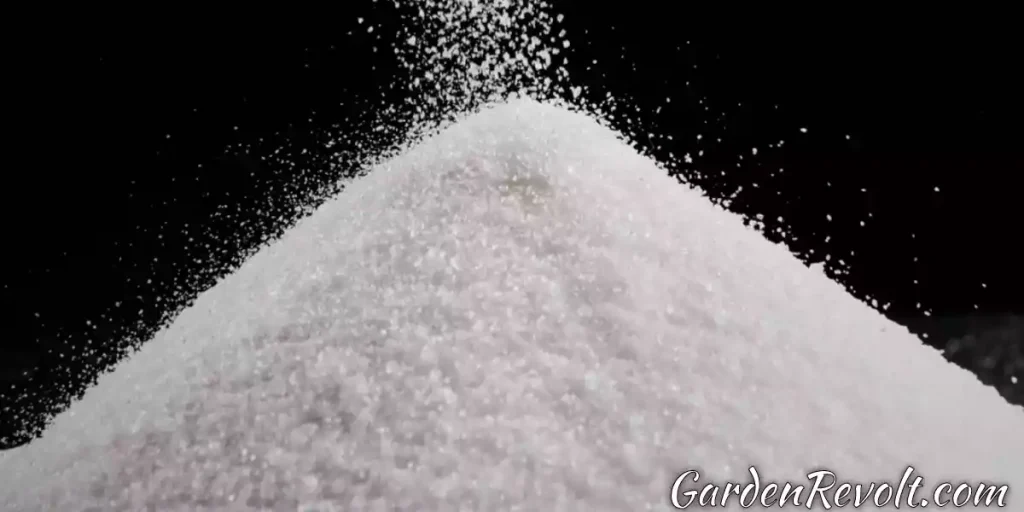
4. boric acid mixed with sugar
By mixing boric acid with sugar, you can create a quite effective poison that will work on the entire anthill. Boric acid is a natural chemical compound, but it is toxic to humans and animals.
Ants that encounter boric acid and sugar will think they have found a sweet food. This will cause the ants to carry this poison back to the anthill.
This method will not work immediately but will effectively knock out the entire anthill. Depending on the situation, this method can take from 2 to 4 weeks.
I personally tried this method myself by mixing boric acid, sugar and jam. I left a little of this slurry in the areas where the ants had formed a path for themselves and be patient. Perhaps the use of jam was unnecessary but in the end it worked wonders.
At the time, I was struggling with a recurring invasion of Pharaoh ants in our kitchen. Since then we have had holy peace with ants in the house. It will work just as effectively in the garden.
5. boiling water
A fairly simple method. Just pour boiling water over the anthill. Of course, this is a method that only works if you know where the ant nest is. You have to take into account the fact that ants build their habitats to resist rain and flooding. So it may take a few tries before you eliminate the queen (and destroy the entire colony).
There are two things to keep in mind when using boiling water:
- Boiling water should not be poured on the lawn, as it will burn the grass. Instead, you can try using lots of cold water to disrupt the ants’ habitat.
- Boiling water may not be an effective solution if the nest is under a flagstone or paving stone.
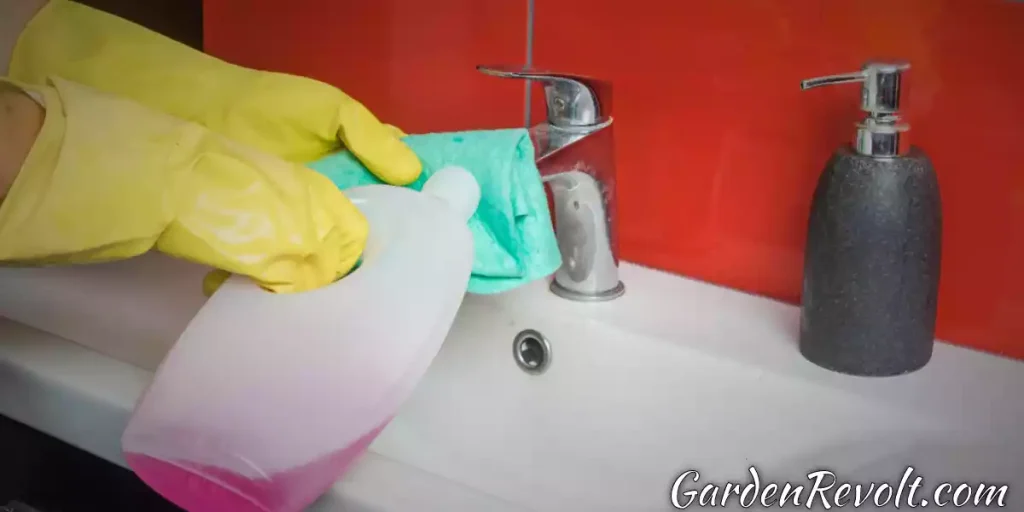
6. a mixture of dish liquid and oil.
This method is said to be quite effective, as dishwashing liquid and oil are said to soak into the ants’ exoskeleton, causing suffocation. All you have to do is mix a teaspoon of dishwashing liquid and one and a half teaspoons of cooking oil (olive oil or canola oil) with 1 liter of water.
After making the mixture, pour some of it into a spray bottle, spray around the nest, and then pour the rest directly into the nest.
7. nematodes
These are microscopic worms that are a kind of nemesis of ants. They prey on ants and devour them, causing the ants to most likely look for a new nest, as they will not tolerate the presence of nematodes.
8. Plants that repel ants
There are various plants, especially those that have essential oils that emit a specific smell that repels ants and other unwanted insects.
“Professional” Ways to repel ants (chemical)
- Ant gel
Most garden stores sell ant control products in gel form. It works on the same principle as boric acid and sugar. The gel attracts ants, which is then carried to the nest where the queen can feed on it. Although it is a poison, it poses no threat to the garden or plants.
- Ant powder
Powdered poisons are best used to control ants indoors or near the house. As a result of their toxicity, they can affect plants and alter the soil. Be sure to take some precautions, such as fencing off the poisoned area to prevent pets and small children from accessing it. Spread the product on a sunny day, as wind can carry the poison to neighboring gardens. Also keep in mind that ants can slowly become immune to the poison.
- Professional extermination
It may happen that none of the methods described above works.In such case – you might have to decide to hire a professional.
How to get rid of a large anthill?
The easiest way to get rid of a large anthill is to use a mixture of boric acid and sugar. This is the least invasive method for the garden because the acid only harms the insects. Spread the prepared powder near the nest and on the ants’ paths. They will carry it back to the nest, thinking it is sweet food. This is a method for the patient – in a few days the ant population should begin to decrease dramatically. Until the entire colony completely disappears.
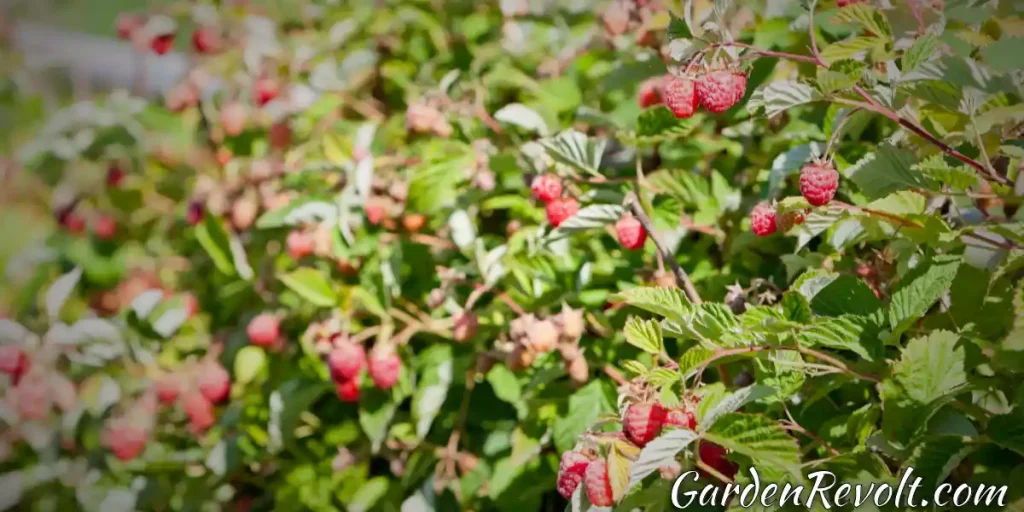
How to get rid of ants from raspberries?
Ants do not harm raspberries. In fact, they only feed on fruit that is already damaged. The easiest way to deal with ants on raspberries is to simply live in a symbiosis with them, and wash the fruit thoroughly before eating. But if the sight of ants bothers you too much, you can try some proven elimination methods.
- Start by removing all branches of the raspberry bush that touch the ground. Simply direct them so that they grow upward. This way the ants will have less “open doors” to enter the plant. In addition, access to the fruit will be more difficult.
- Spread diatomaceous earth nearby.
- If you do not want to kill ants – sprinkle the bushes with a little cinnamon, black pepper, cayenne pepper or chili. They have a deterrent effect on ants.
- Plant herbs and other plants that have a strong scent. Plants such as peppermint, garlic, rhubarb and peas repel ants. You can also dip cotton balls in peppermint oil or other oil with a strong scent and spread them near the plants.
- Get rid of aphids – I wrote about them a little more below in this article.
- Until you get rid of the aphids, I suggest watering your raspberries with fertilizer as INFREQUENTLY as possible (if you do it at all). Nitrogen compounds in fertilizers promote aphid reproduction – and we don’t want that. Therefore, fertilize plants only when necessary.
- Boiling water. The most eco-friendly method to get rid of ant nests. Pour boiling water over the anthill once a day for the next few days. I think 5-10 liters at a time should be enough. But please take into account that with boiling water you can also destroy plants and other creatures nearby.
- Ant traps. You can try buying ready-made ones in stores or drape raspberry stems with double-sided tape or something similar. In my humble opinion – a waste of time on them.
And Are Ants Harmful to Tomatoes?
Ants in themselves are harmless to tomatoes, but they can be attracted by aphids, which like to feed on tomatoes. And these feed on honeydew, which the aphids obtain after sucking the sap from the tomato plant.
The ants may also be looking for larvae to attack. Therefore, the presence of ants on tomatoes very often indicates that they are already under control of other pests.
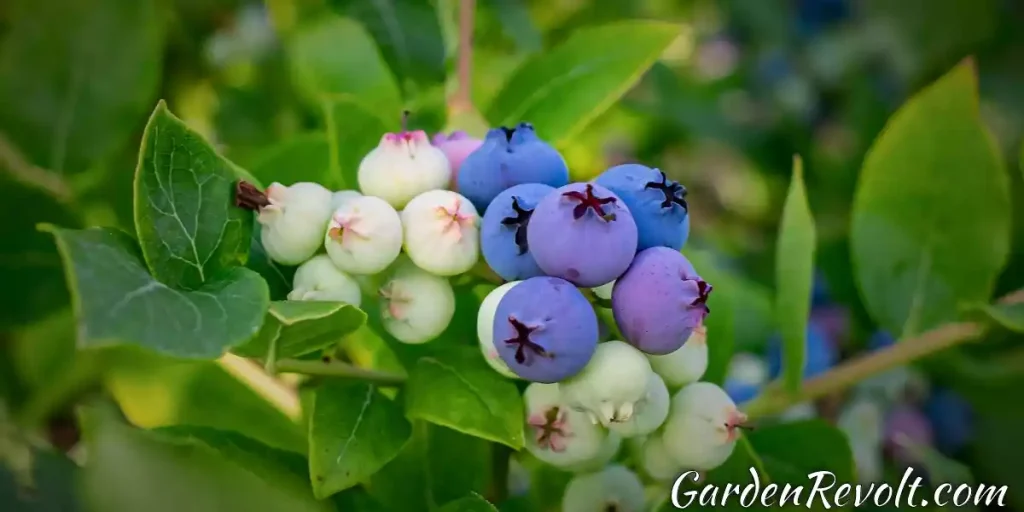
How to get rid of ants from blueberries?
When dealing with blueberries, things are the same as with raspberries. Ants do not cause direct damage to the plant, but they support and protect other insects that harm the fruit. Nowadays, most varieties of blueberries have been specially bred for pest resistance. And also to make it easier to grow. Nevertheless, if you notice ants on your blueberries, you can easily get rid of them and discourage them from returning.
- Make a support for the lower branches in such a way that they are not near the ground. You can also trim them. Blueberry branches should be about 30-50cm above the ground. This way, ants will have fewer entrances to the bush.
- The soil around the blueberry bush should be moist, making sure that it never dries out completely. This will keep the blueberries healthy and reduce the number of ants passing through the soil.
- Secure the blueberry trunk near the ground to a height of about 20-25cm. You can wrap it with a piece of cardboard and tape it with ordinary tape (or a special one for insects). Look once every few days and if necessary – replace with a new one.
- Baits and traps for ants. Such baits attract worker ants, which, unaware of anything, take the bait to the nest, poisoning the entire ant colony with it. This is an effective method of controlling intruders and does not require the use of sprays or other chemicals. However, care should be taken around children and pets.
- Control aphids. They are the ones that attract ants to the bush. You can spray blueberries with a stream of water and, if necessary, use potassium soap (gray soap) directly on aphids. The residue of such soap decomposes quickly and is so safe. If in doubt, read the information on the package and rinse blueberries thoroughly before eating.
Do Ants Harm Cucumbers?
Ants are not harmful to cucumbers and their leaves and flowers. The presence of ants on cucumbers is usually caused by the presence of aphids. The ants are busy collecting their honeydew, or gathering nectar in the flowers. As you know, honeydew is a sweet, sticky sap secreted by aphids, which ants feed on.
What Do Ants Like?
Ants like food, water and flowers. If they get on the trail of food – especially sweet food – you can be sure they will make every effort to find it. Spilled drops of sodas or fruit juices, candies, jellies and jams, cakes and other sweet baked goods, honey and syrup, and overripe fruit.
This is because ants have an excellent sense of smell, which allows them to track down a variety of favorite foods. And most ant species also crave sugar.
But it’s not just sugar that attracts ants. Proteins and fats are also important to most species. That’s why you’ll often find ants roaming around fats, pieces of meat, eggs, animal food, and even nuts, cheese and butter. In addition, most ant species readily devour other insects, both living and dead. Even cereals, in the form of bread or rolls, are attractive snacks.
Do Coffee Grounds Repel Ants?
Coffee grounds alone, whether fresh or used, will not kill ants. They would have to be combined with other ingredients, such as boiling water or boric acid. Boiled coffee can be poured into an anthill – one only wonders why it would be wasted… Coffee can cause a so-called residual effect, which could scare off the surviving individuals.
On the other hand, soaked coffee grounds can create a kind of barrier that has a strong aroma, discouraging ants from returning. Due to the fact that coffee grounds alone will not harm any ants or plants, this is one of the friendliest ways to control ants.

